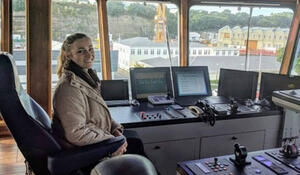
- Name: Kasey Oomen
- Employer: Toitū Te Whenua LINZ
- Job Title: Resilience Advisor
- Qualification(s)/course of study: BSc Environmental Science, PGCert GIS
- Tertiary Institute(s): Victoria University of Wellington
- What Year 13 school subjects did you take: Calculus, Visual Art, Chemistry, Physics, English
- What Secondary School did you attend: Wairarapa College
Why did you choose to study GIS?
I stumbled across GIS during my undergraduate when I was switching my major to Environmental Science from Cell and Molecular Bioscience. Even though studying GIS meant that I had to add extra papers outside of my majors I was willing as I was curious and had read about how GIS was integral to land-based resource management and environmental monitoring.
What are some of the benefits you’ve experienced from studying GIS?
I have learned more about the history of GIS, its applications and I have improved my computing abilities. I have also met some amazing and passionate people and I gained my job at LINZ, which has allowed me to learn and become involved in areas like the New Zealand Coordinated Incident Management System (CIMS). CIMS describes how New Zealand agencies and organisations coordinate, command, and control incident response of any scale, how the response can be structured, and the relationships between the respective CIMS functions and between the levels of response.
How important is GIS for your existing and future career options, and why?
Very important. I plan to continue working in GIS for the foreseeable future, and I would like to volunteer my GIS skills for humanitarian and environmental causes and within my community going forward. Kasey is of Ngāti Porou descent, and wishes to reconnect with and learn more about her heritage.
What advice would you give to future students considering adding a GIS component to their studies?
Do it! You will only ever find out if GIS is for you through doing it. There are plenty of free short online courses you could investigate if you are unsure whether GIS for you. Having an interest in geography, the environment, and the data and computing sciences is helpful.